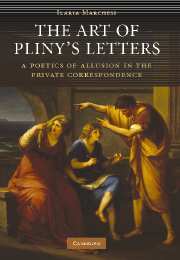Book contents
- Frontmatter
- Contents
- Acknowledgements
- Preface
- Introduction
- Chapter 1 The semiotics of structure
- Chapter 2 Sed quid ego tam gloriose? Pliny's poetics of choice
- Chapter 3 The importance of being Secundus: Tacitus' voice in Pliny's letters
- Chapter 4 Storming historiography: Pliny's voice in Tacitus' text
- Chapter 5 Overcoming Ciceronian anxiety: Pliny's niche/nike in literary history
- From dawn till dusk: four notes in lieu of a conclusion
- Appendix to chapter 5
- List of works cited
- General index
- Index locorum
Chapter 2 - Sed quid ego tam gloriose? Pliny's poetics of choice
Published online by Cambridge University Press: 22 September 2009
- Frontmatter
- Contents
- Acknowledgements
- Preface
- Introduction
- Chapter 1 The semiotics of structure
- Chapter 2 Sed quid ego tam gloriose? Pliny's poetics of choice
- Chapter 3 The importance of being Secundus: Tacitus' voice in Pliny's letters
- Chapter 4 Storming historiography: Pliny's voice in Tacitus' text
- Chapter 5 Overcoming Ciceronian anxiety: Pliny's niche/nike in literary history
- From dawn till dusk: four notes in lieu of a conclusion
- Appendix to chapter 5
- List of works cited
- General index
- Index locorum
Summary
Surely, the proper language of love – that is, of communication to the beloved and to no one else – is prose.
T. S. Eliot, The Three Voices of PoetryPliny's nine books of private correspondence document his engagement primarily with one activity, law. Their author is a court advocate, a legitimate player in his political circle, and a busy patron of friends in the centumviral court. Readers are told about the main trials in which he takes an active part, with numerous references to his revising, polishing, honing, and finally publishing his orations. But Pliny's engagement with oratory is not exclusive: it accompanies, and stands out against, a wider background of allusions to different literary activities, the first of which is the composition of poetry. In one of the later epistles of Book 9, he lightheartedly admits that excelling in one thing is better than doing several moderately well, but that moderate skill in several things is better if one lacks the ability to excel in one. Bearing this in mind, he admits, he has tried his hand at various styles of composition, lacking self-confidence in any one:
Ut satius unum aliquid insigniter facere quam plurima mediocriter, ita plurima mediocriter, si non possis unum aliquid insigniter. Quod intuens ego variis me studiorum generibus nulli satis confisus experior.
(Ep. 9.29.1)Just as you are better off being good at one thing than being mediocre at many, so if you are not good at one thing in particular, be at least mediocre at many. That's why I experiment with all kinds of literature: I don't trust myself to be any good at any of them in particular.
- Type
- Chapter
- Information
- The Art of Pliny's LettersA Poetics of Allusion in the Private Correspondence, pp. 53 - 96Publisher: Cambridge University PressPrint publication year: 2008

